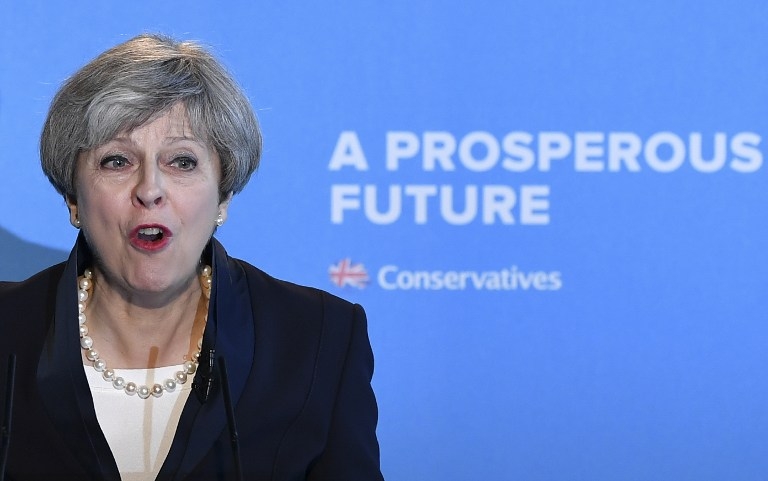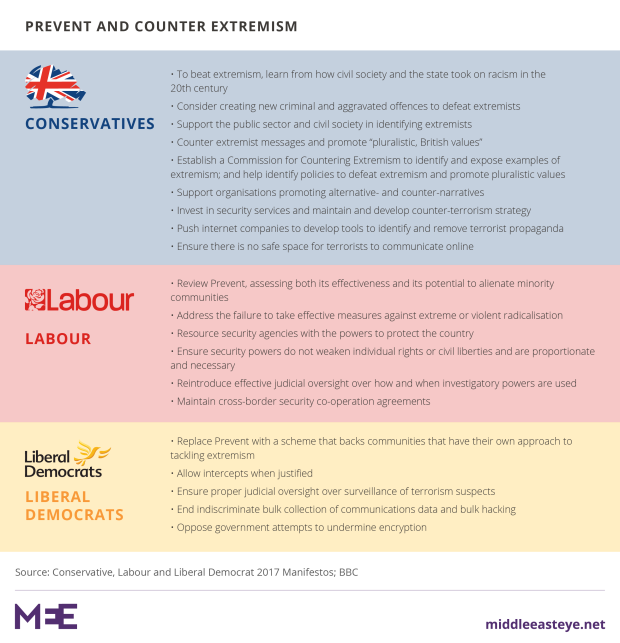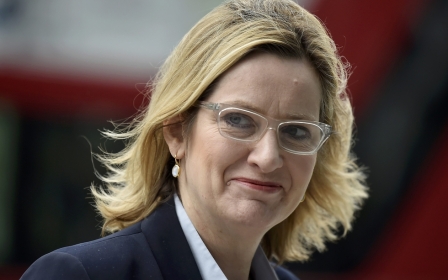After admitting it can't define 'extremism', Conservative Party pledges to defeat it

The Conservative Party in Britain has dedicated a whole section of its manifesto to "defeating extremism" - despite the Tory government's recent admission that it was unable to find a legal definition of the term.
Prior to the election, Home Secretary Amber Rudd admitted that the government did not have a legal definition of extremism, almost two years after pledging to deliver a new strategy to "defeat the extremists".
Rudd, who is now standing for re-election, admitted to MPs in March that the lack of definition had stalled the government's work to address extremism.
'How does the government expect to fight extremism if it has no idea what it is?'
- Samayya Afzal, Students Not Suspects campaign
In a letter to the parliamentary human rights committee, Rudd said: "As your committee report makes clear, this policy area raises complex issues relating to freedom of speech and the importance of having a clear legal definition of extremism."
“These are issues that my department continues to consider and, as you know, we have committed to a full consultation on any new legislation before it is introduced.”
Launched on Wednesday, the Conservative manifesto pledged to create a commission to "identify examples of extremism and expose them," despite having no working definition of the term "extremism".
It also said the Conservatives would support the "public sector and civil society in identifying extremists" if elected back into government in June, implying that it will continue the implementation of the Prevent strategy, which legally obligated every public sector body to report individuals suspected of being a potential extremist.Commenting on the manifesto, Samayya Afzal, who co-founded the "Students Not Suspects" campaign, asked: "How does the government expect to fight extremism if it has no idea what it is?"
"The lack of definition has led to the continued criminalisation of particular communities over the years and the implementation of policies which have been lambasted by human rights groups and the UN as being racist and Islamaphobic.
"Rather than committing to continue policies which have proven to be problematic, the Tories should commit to a commission that seeks to review these policies, with the goal of abolishing them," Afzal told MEE.
What other parties think
Other political parties have deviated from the Conservative's commitment to the current counter-terror laws and pledged to either review Britain's counter-extremism policies or abolish them.
The Conservative government pledged to introduce a new counter-extremism bill in both its 2015 and 2016 Queen’s Speeches, in which it sets out its priorities and proposed legislation for the parliamentary year.
In its last iteration, the government said the bill would give law enforcement agencies "new powers to protect vulnerable people – including children – from those who seek to brainwash them with extremism propaganda so we build a stronger society around our shared liberal values of tolerance and respect".
Theresa May, then home secretary and now prime minister, announced a new counter-extremism strategy in March 2015 in which she pledged the government would “tackle the whole spectrum of extremism, violent and non-violent, ideological and non-ideological, Islamist and neo-Nazi – hate and fear in all their forms.
“The starting point of the new strategy is the emphatic rejection of the misconception that in a liberal democracy like Britain, 'anything goes', the belief that living in a society like ours means there aren’t really any fundamental rules or norms. Instead, the foundation stone of our new strategy is the proud promotion of British values,” May said at the time.
Middle East Eye propose une couverture et une analyse indépendantes et incomparables du Moyen-Orient, de l’Afrique du Nord et d’autres régions du monde. Pour en savoir plus sur la reprise de ce contenu et les frais qui s’appliquent, veuillez remplir ce formulaire [en anglais]. Pour en savoir plus sur MEE, cliquez ici [en anglais].





